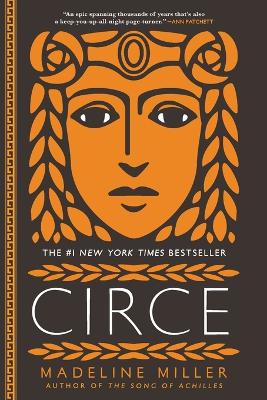Reviewed by Quirky Cat on
If you’re anything like me then you’ll feel my pain here; I love Greek mythology, but I am absolutely horrid at remembering names. Therefore if they’re not a commonly mentioned god or goddess I don’t always remember their details or story. I looked Circe up before I started reading this, and I’m glad I did.
Circe is the goddess of magic. She’s been called a nymph (because of her lineage), a witch (for obvious reasons), enchantress (again, kind of obvious), and sorceress (again). Her mother was Perse (hence the whole nymph thing) and her father Helios (sun god). Her siblings all appear in Greek mythology as well and I recognized them to varying degrees (Aeetes, Perses, and Pasiphae).
The other thing I learned that was of note about Circe (and this one I looked up after reading the novel and finding myself confused); Circe is frequently confused with Calypso. They have similar (ish) temperaments, abilities, and some of their…altercations are similar. This will make more sense when you read (unless you’re better at Greek mythology than I am, and already know what I’m referring to).
Warnings first: A helpful and friendly reminder here; Greek mythology is not known for being kind to people, including women (both humans and goddesses). This comes up several times, with one more graphic scene a good chunk of the way through the novel (I don’t remember the exact location – but you’ll see the scene coming, promise). Considering the time, basis of mythology, and the characters being talked about, this does fit with the story being told; still I thought it’d be nice to warn people about.
Before looking up Circe in preparation for her novel, I didn’t remember much about her. Despite that I was really excited to get to sink my teeth into some Greek mythology (it’s been far too long), and I like the idea of focusing on a more minor character (relatively speaking). Seeing the same stories from their eyes provides such a unique and interesting perspective; even anticipating that this would be the case I still found myself surprised by the depth of it.
Madeline Miller clearly did her research here; the world that Circe lived in is so heavily based in mythos that would be easily compared again, so there wasn’t much room for error on her part. But she still did is flawlessly. At the same time, she had a lot of information and work to full from, and yet I never felt like she was heaping information on me (you know what I mean; when an author spends so much time researching a subject that they feel compelled to prove it by info dumping into the novel).
What I loved the most about Circe is just how human Miller made her. Obviously humans can act godlike, and vice versa, but it’s so rarely seen in storytelling. This was wonderfully refreshing. We were given a glimpse into Circe’s past, her motivations, her hopes and dreams, everything that made her the goddess and witch we all know. Her actions and reasoning were suddenly clearer to me than ever before, and I can safely say that I will no longer be confusing her with Calypso.
I’m impressed by Miller’s storytelling style and level of effort she put into this novel. Everything felt effortless but at the same time flowed so beautifully. Almost like the prose it is birthed from. I’ve heard a bit about her other novels, but the chatter for Circe easily overwhelms anything else I’ve heard, and I have to say, it’s earned the praise. I’m looking forward to what Miller comes out with next; I have no doubt she’ll stick with Greek mythology, but I know which god (or goddess) she’ll pick next. I could start digging online for clues for the next novel, but I think I’ll wait and be surprised.
For more reviews, check out Quirky Cat's Fat Stacks
Reading updates
- Started reading
- 3 May, 2018: Finished reading
- 3 May, 2018: Reviewed
